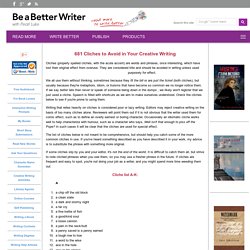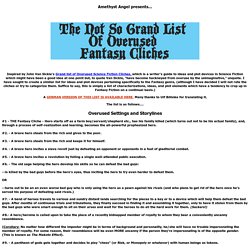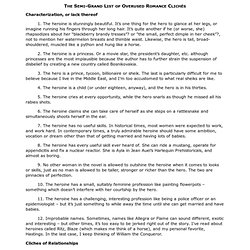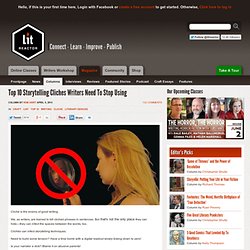

Cliche Finder. Have you been searching for just the right cliché to use?

Are you searching for a cliché using the word "cat" or "day" but haven't been able to come up with one? Just enter any words in the form below, and this search engine will return any clichés which use that phrase... Over 3,300 clichés indexed! What exactly is a cliche? See my definition Do you know of any clichés not listed here?
This is Morgan, creator of the Cliche Finder. Or, you might like my crazy passion project: Spanish for Nerds: Learning Spanish via Etymologies! Back to cliches... if you would like to see some other Web sites about clichés? © S. Special thanks to Damien LeriAnd to Mike Senter Morgan's Web page. Synonyms for the 96 most commonly used words in English. Amazing — incredible, unbelievable, improbable, fabulous, wonderful, fantastic, astonishing, astounding, extraordinary Anger — enrage, infuriate, arouse, nettle, exasperate, inflame, madden. The Fantasy Cliche Meter: The Bad Guys. 500 Cliches to Avoid in Your Creative Writing. Cliches (properly spelled clichés, with the acute accent) are words and phrases, once interesting, which have lost their original effect from overuse.

They are considered trite and should be avoided in writing unless used purposely for effect. We all use them without thinking, sometimes because they fit the bill or are just the ticket (both cliches), but usually because they're metaphors, idiom, or truisms that have become so common we no longer notice them. If we say better late than never or speak of someone being down in the dumps , we likely won't register that we just used a cliche. Speech is filled with shortcuts as we aim to make ourselves understood. Check the cliches below to see if you're prone to using them. Writing that relies heavily on cliches is considered poor or lazy writing. The list of cliches below is not meant to be comprehensive, but should help you catch some of the more common cliches in use.
Cliche list A-K: Cliches. #1 - A wedding takes place where the phrase "And if there's anyone present who can see why these two shouldn't be joined in marriage, speak now or forever hold your peace," is followed by a scene in which nobody holds their peace.

(Corollary: It is a Universal Rule of Fantasy that the hero and his buddies, when attempting to stop a wedding between the hero's love interest and the villain, MUST choose the particular moment after that phrase is uttered, to launch their attack, --even if waiting to do so puts them at a strategic disadvantage.) #2. - The all-powerful wizard/seemingly unbeatable enemy turns out to be a mischievous child or a dinky old man behind a curtain. #3. - The villain's fortress starts to crumble around our heroes the moment he is defeated, leaving our heroes just barely enough time to escape before it collapses. #4. - The overly friendly (or, in some cases, vaguely menacing) bishop or church official turns out to actually be at the head of the evil cult. #15.
Cliches. Cliches. Characterization, or lack thereof 1.

The heroine is stunningly beautiful. It’s one thing for the hero to glance at her legs, or imagine running his fingers through her long hair. It’s quite another if he (or worse, she) rhapsodizes about her “blackberry brandy tresses”? Or “the small, perfect dimple in her cheek”? Cliches. Cliché is the enemy of good writing.

We, as writers, are trained to kill clichéd phrases in sentences. But that's not the only place they can hide—they can infect the spaces between the words, too. Clichés can infect storytelling techniques. Need to build some tension? Have a time bomb with a digital readout slowly ticking down to zero! Is your narrator a dick? Want to get all writerly in conveying the plot? These are storytelling devices that pop up again and again, crutches for the writer to lean on and help move the story along without actually having to stretch their abilities. 1. Why it's easy: Describing a character when you're writing in the third person is pretty easy when the narrative voice is omniscient. Why it's a cop out: It's lazy, it's been done to death, and anyway, no one looks in a mirror and takes stock of all their features in severe detail. 2.
Why it's a cop out: This is the "little did he know" principle of storytelling. 3. 4. 5. 6. 7. 8. 9. 10. Redundancies.